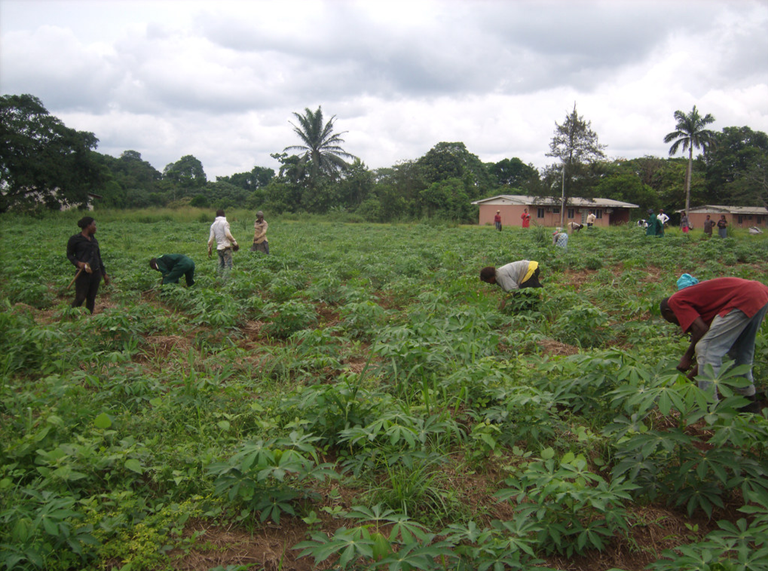The lamentation of a farmer
In the southwestern reaches of Nigeria, where the vibrant hues of our farmlands once mirrored the kaleidoscope of our culture, a shadow looms over our fields. The changing climate has become a silent intruder, disrupting the rhythm of our agrarian lives in ways we never imagined.
As I stand amidst what used to be my flourishing cassava farm, memories of abundant harvests are eclipsed by the stark reality of today. Unpredictable weather patterns, hotter temperatures, and erratic rainfall have transformed our once-predictable farming calendar into a gamble with nature. The land that once cradled our sustenance has become a battleground, and each day feels like a skirmish against an unseen foe. Gaari, a product from cassava, that used to be quite affordable is gradually becoming a food for the rich.
Let me share the story of Ayo, a fellow farmer whose struggles epitomize the challenges we face. Ayo, once the proud custodian of a thriving cocoa plantation, now stares at withered trees, their once-luscious pods replaced by a desolate silence. The prolonged droughts and unrelenting heatwaves have left him with little more than cracked earth beneath his feet. Ayo's tale is a reflection of the broader narrative echoing across our community—a narrative of loss, adaptation, and resilience. Yes, the poor exchange rate makes him to get more from poor harvest, but he's left wondering what could have been with a bountiful harvest.
Could these heart-wrenching stories have been averted? The answer, to some extent, lies in the hands of those who could have acted sooner. The emissions from industrialized nations, their pursuit of progress, or should I say profit, fueled by fossil fuels, cast a long and looming shadow over our once-fertile lands. Sustainable practices and a collective global effort to reduce emissions could have mitigated the impacts that now threaten our very existence.
Mitigation, however, remains our rallying cry. Ayo and I, along with many others, believe in a future where climate change is not just an adversary but a challenge we've overcome. I know that tons of research have already been carried out, with much more still on the way. What percentage of the recommendations from these research have been implemented or being considered for implementation? International support is not charity but a lifeline we desperately need. Financial assistance, technological empowerment, and capacity-building initiatives could equip us with the tools to navigate the turbulent waters of climate change.
Recounting our tales of struggle is not an appeal for pity; it is a call to action. Reforestation projects tailored to our unique landscape, sustainable agricultural practices, and investment in renewable energy are not just solutions; they are beacons of hope illuminating a path toward resilience.
Take, for instance, the success story of Kemi, a visionary woman in our community. Armed with newfound knowledge about sustainable farming practices, she transformed her small plot into a model of resilience. Rainwater harvesting, organic fertilizers, and agroforestry became her allies against the changing climate. Kemi's success is proof that with the right support and knowledge, we can turn the tide.
Education is the linchpin of this transformative journey. By fostering awareness about climate change, we empower ourselves and our community to adapt and thrive. Knowledge is not just power; it's a shield against the uncertainties that lie ahead.
The southwestern winds that once brought the promise of rain now carry whispers of change. In every rustle of the leaves and every gust of the wind, we hear a plea for a sustainable future. As a farmer in southwestern Nigeria, my voice may be small, but my hopes are as vast as the fields I till. Together, let us sow the seeds of resilience, for a future where our lands thrive once more, and our stories resonate not with despair but with triumph over adversity.
That's it about my lamentation, I hope it makes an impact in the echo chamber.
Resources
- http://eprints.abuad.edu.ng/395/1/28492-Article%20Text-53582-1-10-20190121.pdf.
- https://www.cbn.gov.ng/OUT/2012/PUBLICATIONS/REPORTS/STD/EFFECTS%20OF%20GLOBAL%20CLIMATE%20CHANGE%20ON%20NIGERIAN%20AGRICULTURE.PDF.
- https://www.futurelearn.com/info/futurelearn-international/impacts-climate-change-in-nigeria.
- https://theconversation.com/a-deadly-duo-climate-change-and-conflict-are-fuelling-nigerias-food-insecurity-crisis-206042.
- https://www.naijadazz.com/sustainable-agriculture/.
- https://www.mondaq.com/nigeria/renewables/1295912/the-case-for-investments-in-nigerias-renewable-energy.
- https://www.irena.org/Publications/2023/Jan/Renewable-Energy-Roadmap-Nigeria.
- https://www.unicef.org/nigeria/research-and-reports.
- https://www.unicef.org/nigeria/press-releases/children-nigeria-extremely-high-risk-impacts-climate-crisis-unicef.
- https://www.apeare.org/climate-change/how-to-enhance-agriculture-and-protect-the-environment-6-sustainable-farming-practices-in-nigeria/.
